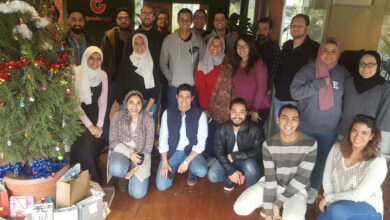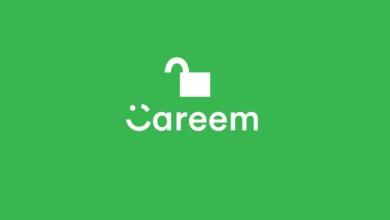
Aside from the never-ending ancient archeological discoveries, Egypt is one of the fastest-growing startup ecosystems in MENA. A Magnitt report ranks the country as the second largest startup ecosystem in the region, capturing 22 percent of all deals in 2018, with a 7 percent increase in total deals from 2017. The Pharaohs have promising ventures on the rise, with startups like Swvl raising a total of US $80.5 million.
In this Egypt spotlight, we’ve got an Endeavor entrepreneur joining forces with a coder and a veteran business developer to provide underserved commuters with affordable three-wheel rides. And Y Combinator grads building a startup that detects bugs with just a phone shake!
All aboard? Get ready for a powerful tech-driven journey into the mysterious land of Egypt!
Halan ‘All Hail Three-Wheeler Rides’
The ride-sharing market is worth as much as $5.7 trillion in 175 countries across the globe. MENA’s ride-hailing market is projected to grow from $2.4 billion in 2017 to $7.3 billion by 2023, propelled by increased investments and rising competition between unicorns Careem, Uber, and Swvl. Halan (Arabic for immediately) is the latest addition to the ride-sharing lot.
Navigating bumpy roads and areas beyond the scope of most conventional means of transportation, Halan’s two and three-wheelers — think tuk-tuks, motorbikes, and cargo tricycles — reach underserved commuters. A single Halan ride costs up to 80 percent less than its ride-hailing counterparts. The 2017 Cairo-based startup also provides B2B and B2C logistics solutions and offers delivery services for everything from food to heavy goods like fridges.
Investment
Backed by Algebra Ventures and Battery Road Digital Holdings, Halan’s total funding amounts to $5 million. Since its launch, the startup notched over three million rides in 2018 alone. It gained unparalleled traction with over 1 million downloads, crowning the platform as one of the fastest-growing apps in the region.
Halan aspires to bridge the gap between public transport and expensive ride services in emerging markets, with plans to expand in Ethiopia and across five Egyptian governorates by the end of the year.
Founding Team
Selected among 52 high-impact entrepreneurs in Egypt by Endeavor, CEO Mounir Nakhla has over a decade of experience building microfinance businesses. His venture Halan grew out of a passion for creating fast, affordable, and convenient transportation solutions for underserved communities. “We’re penetrating the regions of Egypt where 80 to 90 percent of the population resides,” Mounir told the National.
Mounir honed his entrepreneurial skills at several microfinance companies. In 2015, he founded Tasaheel, which grew to become Egypt’s second-largest microfinance company in less than four years, with over 500,000 active borrowers, 200+ licensed branches across Egypt, and over 6,000 employees.
In 2010, Mounir founded Mashroey, an asset-based microfinance company that sells two and three-wheelers. As Managing Director, he scaled the company to over 100 branches across Egypt and grew its products’ portfolio to include electrical appliances and affordable housing.
Mounir also worked at Environmental Quality International (EQI). As Managing Partner, he helped EQI become a leading microfinance consultancy, with two operating subsidiaries in sustainable ecotourism and microfinance loan-tracking software industries.
On keeping up with the competitive transportation space, Mounir told Wamda, “Our history, our DNA makes us understand and know these areas and markets better than anyone else. We’ve been working in these underserved communities for more than a decade.”
Mounir has an MS in Environment and Development from the London School of Economics and a BS in International Business from the European Business School.
CCO Mohamed Aboulnaga has over a decade of experience in business development across many sectors, including e-payments, retail, and tech. Leading several roles at Egypt’s e-payment network, Fawry, Mohamed worked with FMCG companies on their cash collection model. He developed the B2B pipeline and was responsible for corporate cash management.
At Careem, Mohamed assumed many executive positions, including Business Development Director, Commercial and Governmental Relations Director, and Regional Director. He was also CCO of NOG Investments, a company that invests in Egyptian SMEs. He is a Board Member of Robusta Studio and ShopX.
CTO Ahmed Soliman is a coder and a tech whiz with expertise in software engineering. He was CEO of CircleTie, a mobile social networking and directory application. He was also Security Engineer at Securemisr and Software Engineer at IBM.
Both Mohamed and Ahmed graduated from the American University in Cairo with BS degrees in Electronics Engineering and Computer Science. Here’s to all-nighters at AUC labs!
Instabug “Streamlining Mobile One Bug at a Time”
Welcome to the latest addition to the Endeavor network of high-impact entrepreneurs. Just this week, Instabug got recognized for making everyone’s app usage a lot easier. And if you’re one of the 25,000 companies relying on this startup, you might know exactly whom we’re talking about.
Founded in 2012, Instabug is a startup that helps maintain high-quality apps through bug reporting, instant user feedback, and diagnosis. Instabug takes under a minute to integrate and a small shake of your phone to invoke their tool as fast as it sounds. They serve reputable teams with no time for delay, like those of PayPal, BuzzFeed, Samsung, Lyft, and Soundcloud. It’s close to sorcery if you ask us!
With 5.1 billion unique mobile subscribers worldwide, the app development market is expected to grow by 14% from 2016 to 2022. And with fierce competitors in the industry, Instabug mainly prides over its edge in speed, with instant feedback and crash reports throughout the entirety of an app’s cycle.
But it isn’t just Instabug’s solutions that speed by. It’s also its steady growth and ambition as a company. “Building Egypt’s first Unicorn” is a slogan they go by, and while it’s a hefty aspiration, it has had much to stand on. Instabug’s last round in 2016 was worth $1.7 million, led by Silicon Valley’s Accel Partners, which came in only three years after a US $300,000 Seed round. Their scaleup as a company was coupled with a rapidly growing base of users — 400 million reported issues and 2 billion devices running their Software Development Kit — making them a force to be reckoned with regionally and globally.
Founding Team
Along with an entire ‘Bugsquad,’ this founding team embarked upon this journey early on. Both CEO Omar Gabr and CTO Moataz Soliman were fresh out of undergraduate degrees in Computer Engineering from Cairo University when they started Instabug. “Seven years ago, we launched Instabug as a demo video — a cool idea that went viral within developer circles like Hacker News,” narrates Omar.
With positive word-of-mouth on their side, they took this feedback further and developed a go-to product in bug reporting. In 2013, Instabug won first place at the MIT Enterprise Forum Arab Startup Competition. Shortly after, it secured its first seed funding from angel investors and became part of Flat6Labs, a leading Startup Accelerator in Egypt.
They then joined Y Combinator’s Winter 2016 batch as the second Egyptian company to join the accelerator. It was only a matter of time before they secured the Accel round a year later, with Y Combinator on board, along with backers like Amr Awadallah, co-founder of Cloudera, Jim Payne, founder and CEO of MoPub, and Sharif El-Badawi of 500 Startups.
When asked about making it despite some turbulent political conditions, they link their survival back to consistency. “Just showing up, just keeping at it,” Moataz told the Instabug team. “I think it’s mainly that we didn’t give up in any of these situations — and not just Omar and me, the entire team.”
Instabug completely rebranded last August, changing their signature logo bug to fast, zooming symmetrical parallelograms — their first step beyond debugging. “The friendly ladybug was our lucky charm for years, but it was time to evolve our logo and brand,” wrote Omar. The startup was now moving into a wider, integrated system where mobile teams can get a bigger picture of their performance.
As Omar’s Twitter bio proudly claims, his ancestors used to worship bugs, and now he builds apps to squash them. There seems to be an ongoing line of development here. From a ladybug to a dreamed-of unicorn, we can’t wait to see this metamorphosis!
No costume is more frightening than fierce startups ready to scare competitors away, and Egypt has got that one covered. Now, if you’ll excuse us, our AI sorcerers are scheduled to a pre-Halloween party with some mummies they met at a Luxor Temple.



